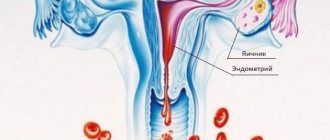In some cases, a woman taking hormonal drugs is accompanied by menstrual irregularities. One of them is heavy periods after Duphaston. To understand the cause of these processes, you need to have an idea of the composition of the product, indications for its use, as well as the effect on the menstrual cycle.
Taking Duphaston can cause heavy periods
What are the indications for using Duphaston?
The drug is prescribed by a qualified specialist after a thorough examination. The drug is effective for conditions during which pathological processes associated with a deficiency of the hormone progesterone occur in a woman’s body. These include:
- menstrual cycle disorders;
- accompaniment of premenstrual syndrome with severe symptoms;
- disorders of ovarian function;
- uterine bleeding;
- early stages of menopause to reduce hot flashes;
Among the indications for the use of Duphaston are infertility diagnosed due to gestagen insufficiency. In this situation, the drug is used as an adjuvant.
Indications for use and dosage
The drug, in addition to inducing menstruation, is also used for other indications (in case of progesterone deficiency):
- endometriosis - duphaston is prescribed from days 5 to 25 of the cycle, 1 tablet twice a day;
- insufficiency of the second phase (luteal) and treatment of infertility caused by it - from 14 to 25 days of the cycle, 1 tablet;
- premenstrual syndrome - from days 11 to 25, one tablet twice a day;
- irregular menstruation - from 11 to 25 days, take a tablet twice a day;
- amenorrhea - in combination with estrogens (from days 1 to 25, once a day), duphaston must be taken one tablet twice a day from days 11 to 25 of the cycle.
If the endometrial response to the drug according to ultrasound is not sufficient (the thickness of the endometrium in the second phase does not reach 10 mm), the dose of duphaston is increased to 20 mg.
What is the composition of Duphaston
The main active component of the product is dydrogesterone. One tablet of the drug contains 10 mg of this substance. Additional components of the product include:
- magnesium stearate;
- lactose monohydrate;
- hypromellose;
- silica;
- corn starch.
The composition of the tablets is quite simple
How does the drug affect menstruation?
The product is recommended for use in the second period of the cycle. This is due to the fact that during this period the hormone progesterone is intensively synthesized in the woman’s body. If there are problems with its formation, as well as the course of the menstrual cycle, the remedy is capable of these processes.
The first menstruation after a delay in most cases occurs 1-2 weeks after starting to take the drug. Copious discharge with clots is considered normal. After a few months of menstruation, women completely stabilize. Before this period during the cycle, the amount of discharge may be increased.
Restoration of menstruation processes is possible only if the drug is prescribed correctly. Duphaston is not recommended to be used independently, since self-medication can harm a woman’s health, which will lead to the development of dangerous complications and aggravate her condition.
Watch this video to learn everything about the action of this drug:
Side effect
Taking duphaston may be accompanied by a number of side effects.
- First of all, during treatment with this drug, breakthrough uterine bleeding may occur, which is eliminated by increasing the dose of the drug.
- Changes in the hematopoietic system and the development of hemolytic anemia are also possible (rare).
- A number of women note the appearance of headaches or migraines, and increased sensitivity of the mammary glands.
- The occurrence of allergic reactions (both rash and in rare cases) cannot be ruled out.
- Possible liver dysfunction (weakness or malaise, etc.).
- And extremely rarely, duphaston provokes the development of edema of the extremities.
Can there be a delay after stopping the drug?
The main reason for missed periods after taking Duphaston is pregnancy. To do this, in the first days of the absence of a cycle, you need to do a test. If a negative result is obtained, the etiology of the delay may lie in other factors listed in the table.
| Reason for the delay | Process mechanism |
| Hormonal imbalances | Duphaston affects the level of progesterone in the body of women. For this reason, it can cause hormonal imbalance. After establishing this delay factor, the doctor selects an alternative treatment tactic. |
| Late ovulation | As a result, the increase in progesterone levels in the body delays the renewal of the endometrium of the uterus. This contributes to the loss of the luteal phase. The menstrual cycle resumes 1-2 weeks after discontinuation of the drug. |
| Disorders of the functioning of the endocrine glands | The thyroid gland, adrenal glands and ovaries are most often affected. If your cycle is delayed by more than 10 days, it is recommended to contact specialized specialists for a comprehensive examination. This will help pathological processes in the early stages of development, which will allow you to prescribe the most effective treatment tactics. |
In addition, experts identify a number of other factors, in the presence of which a woman may experience delays in her menstrual cycle. These include uterine scars and impaired absorption of the active component of the drug.
The effect of duphaston on menstruation
An indicator of normal functioning of the reproductive system is a regular menstrual cycle. Normally it is 28 calendar days. Long delays in menstruation or prolonged bleeding are most likely caused by a lack of the hormone of the second phase of the menstrual cycle - progesterone. We will look at how taking Duphaston and menstruation are related to each other.
Indications for taking Duphaston
One of the main indications for taking Duphaston is amenorrhea, which is caused by impaired ovarian function. Normally, ovulation occurs in the middle of the menstrual cycle, which consists of the rupture of a mature ovary and the release of an egg. At the site of the burst follicle, a corpus luteum is formed, which synthesizes progesterone. Under the influence of this hormone, changes occur in the uterus (proliferation of the endometrium), which contribute to the occurrence of pregnancy and prevent early termination.
The effect of Duphaston on menstruation
Taking Duphaston in the second phase of the menstrual cycle, hormone deficiency is compensated and a correct menstrual cycle is established. Therefore, menstruation should be regular when taking Duphaston, if the cause is correctly identified and treatment is prescribed. Many women want to know before treatment: after starting to take Duphaston, when will their periods come? The most common regimen for taking Duphaston is 1 tablet 2 times a day (20 mg/day) from days 14 to 25 of the cycle. Your period should start on the 28th day, but in practice it happens differently. If your period begins prematurely while taking Duphaston, then perhaps this is the first reaction to taking the drug or the result of an incorrectly chosen treatment tactic. It should be said that after Duphaston there are usually heavy periods. Do not be alarmed if brown, scanty periods appear after Duphaston, this happens at the beginning of treatment, and then the menstrual cycle should become established.
It happens that women decide to take Duphaston on their own to combat amenorrhea. This is very wrong, because thoughtless interference in such a delicate mechanism as the endocrine system can lead to even greater disruptions and problems, which can be much more difficult to cope with. Sometimes such women ask “Why do I drink Duphaston but don’t have my periods?” In fact, a delay in menstruation when taking Duphaston on your own may be the cause of pregnancy or improper self-medication. Therefore, if your period is late, the first thing you need to do is take a pregnancy test.
Delayed menstruation after stopping Duphaston
The main goal of treatment with Duphaston is to normalize the menstrual cycle and, as a result, the onset of a long-awaited pregnancy. If after stopping Duphaston you still don’t have periods, then this is a cause for concern. It is possible that the cause of the disrupted menstrual cycle is damage to the pituitary gland or adrenal glands. In this case, the woman needs a full examination: determination of hormone levels, ultrasound examination of the ovaries and adrenal glands. It is advisable to determine the level of progesterone on days 21 and 23 of the cycle. A mandatory procedure is to measure basal temperature in order to monitor the presence of ovulation.
There is a theory that Duphaston can be taken to delay menstruation. Sometimes it actually causes a delay, but in most cases it leads to disruption of the endocrine system.
Thus, having considered the effect of the drug Duphaston on the menstrual cycle, we can conclude that only its reasonable prescription, taking into account all the characteristics of the patient, will give a positive effect from the treatment. Independent uncontrolled use will lead to hormonal imbalance.
Why periods can become heavy
A normal menstrual cycle in women is accompanied by the presence of a certain amount of bleeding, its characteristic color, as well as the length of time between them. Its violations can occur due to many factors, including the use of medications. The drug Duphaston was no exception. During its use, heavy discharge is not uncommon.
As a rule, in this case, excessive bleeding is not a pathology.
In most cases, the abundance of menstruation when using the product is not a pathology. Progesterone, which is contained in the product, helps to increase the thickness of the inner lining of the uterus. A woman needs it for a normal pregnancy.
In the absence of conception, endometrial cells are rejected. For this reason, an increase in progesterone levels contributes to an increase in the thickness of the inner layer of the uterus, which leads to an increase in the amount of discharge during the menstrual cycle.
Often, heavy periods in women after taking Duphaston are accompanied by their excessive duration. Due to the increased level of secretions, the uterus needs to be freed from them, which takes a lot of time. It is necessary to pay close attention to your body in order to exclude possible internal bleeding that may be caused by taking the drug.
In most cases, Duphaston does not play a role in heavy periods, which are accompanied by pain. Among the possible side effects of taking the drug, it is worth highlighting:
- migraine;
- dizziness;
- psycho-emotional lability;
- gastralgic symptoms;
- allergy to the components of the product.
Sometimes taking this drug causes migraines.
If you notice heavy periods with clots after Duphaston, it is recommended to contact specialized specialists. They will be able to diagnose the cause of the increase in the amount of discharge, which will give a conclusion about the advisability of using the drug in the future. This will help make the treatment effective and safe for the woman’s health.
Duphaston and pregnancy planning
For many reasons, less than the required amount of progesterone is produced in the second half of the cycle. This prevents normal childbearing and miscarriages occur, so doctors prescribe Duphaston in advance if a woman plans to give birth. The drug is taken according to the usual regimen: from 11 to 25 days from the start of the cycle.
Discontinuation of Duphaston during planning is indicated only in the absence of pregnancy. This should be confirmed by an hCG or b-hCG (human chorionic gonadotropin) test. On which day of the cycle you need to come to the laboratory to submit biomaterial, it is important to ask your doctor in advance. The analysis is done before the 25th day from the start of the cycle, maximum - on the day of cancellation.
If the hCG test result is negative, hormone intake is resumed next month as scheduled. If fertilization has occurred, the drug continues to be taken until the 16th week of pregnancy in the dosage prescribed by the doctor.
The gynecologist explains in detail how to correctly cancel Duphaston when planning. The dose is gradually reduced, so the course ends at approximately 20 weeks of gestation (sometimes longer). Abrupt cessation of taking the drug entails a sudden drop in the amount of progesterone in the body - the “motherhood hormone”. Because of this, the woman’s uterine tone increases, and bleeding may begin, after which a miscarriage occurs.











